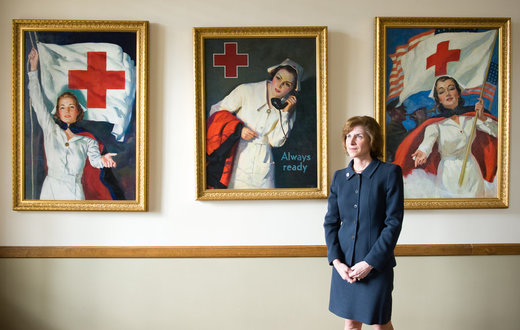
A former AT&T executive who had taught marketing at Harvard Business School, McGovern pledged to make the tough choices that would revitalize the Red Cross, which was chartered by Congress to provide aid after disasters. In a speech five years ago, she imagined a bright future, a "revolution" in which there would be "a Red Cross location in every single community.''
It hasn't worked out that way.
McGovern and her handpicked team of former AT&T colleagues have presided over a string of previously unreported management blunders that have eroded the charity's ability to fulfill its core mission of aiding Americans in times of need.
Under McGovern, the Red Cross has slashed its payroll by more than a third, eliminating thousands of jobs and closing hundreds of local chapters. Many veteran volunteers, who do the vital work of responding to local fires and floods have also left, alienated by what many perceive as an increasingly rigid, centralized management structure.
Far from opening offices in every city and town, the Red Cross is stumbling in response to even smaller scale disasters.
When a wildfire swept through three Northern California counties in September, the Red Cross showed up but provided shelter to just 25 of 1,000 victims at one site. Because of the charity's strict rules and disorganization, many evacuees slept outside for over a week, even when the weather turned bad. "These families were sleeping in the rain with their children," said Wendy Lopez, a local volunteer.
Local officials were so angry they relieved the Red Cross of its duties.
The Red Cross had closed chapters in the area last year. "You're seeing a huge loss of experienced staff," said John Saguto, a 15-year Red Cross volunteer in Northern California.
Some emergency planners around the country have concluded they can no longer rely on the charity.

This year, the Red Cross quietly made cuts in the formula it uses to determine cash benefits to victims of home fires and other disasters. A family of four whose home burned down previously could have received around $900 in immediate assistance. Now they would get a maximum of $500.
Over the past two years, ProPublica and NPR have examined the charity's flawed responses to major disasters, including the 2010 earthquake in Haiti and Superstorm Sandy in 2012. A broader look at McGovern's seven years as chief executive shows her team has repeatedly fallen short of its own goals to secure the organization's financial future and improve its delivery of disaster services.
McGovern declared in August 2013 — her fifth anniversary on the job — that she had executed a "turnaround" that made the Red Cross a "financially stable'' organization with balanced budgets in three of the previous four years.
Behind the scenes, however, losses were mounting. The organization ran a $70 million deficit that same fiscal year and has been in the red ever since. Internal projections say the charity will not break even before 2017.
As part of her effort to run the Red Cross more like a business, McGovern recruited more than 10 former AT&T executives to top positions. The move stirred resentment inside the organization, with some longtime Red Cross hands referring to the charity as the "AT&T retirement program.''
McGovern laid out a vision to increase revenue through "consolidated, powerful, breathtaking marketing."
"This is a brand to die for," she often said.
Her team unveiled a five-year blueprint in 2011 that called for expanding the charity's revenue from $3 billion to $4 billion. In fact, Red Cross receipts have dropped since then and fell below their 2011 level last year.
McGovern declined to be interviewed for this story. Our account is drawn from interviews with present and former Red Cross staffers and volunteers, local disaster relief officials, and hundreds of pages of internal documents.
The Red Cross defended McGovern's track record in a statement, saying she took over an antiquated organization that allowed each local chapter to create its own system for personnel, technology, and bookkeeping. The layoffs and shuttering of local chapters, the statement said, was painful but essential for an organization that was both inefficient and financially unsustainable.
The charity also said the cuts haven't affected its ability to provide aid. "Our focus has always been to cut the costs of delivering our services — not the services themselves — and we believe we have achieved that." It said there has been a small increase over the last three years in overall payments to disaster victims, though data does not exist going back to the start of McGovern's tenure. Of the cuts in the formula for cash benefits, it said that preliminary data under the new system shows that victims are still getting the same level of assistance as in the past.
McGovern had a major accomplishment this month when a federal judge ended two decades of special government oversight of the charity's blood-banking operation, which collects and sells blood to hospitals. The Red Cross, McGovern said in an internal announcement, had achieved "quality and compliance milestones that at one point seemed almost unimaginable."
Still, the unit, which is the Red Cross' largest division, is an increasing drag on the charity's bottom line, in part because changes in medicine have sharply reduced the demand for blood. In its statement, the Red Cross pointed to those changes as the reason for the charity's recent deficits.
But Red Cross insiders said the blood division has also been hurt because the charity bungled a software project and moved too slowly to respond to an evolving industry. Internal estimates obtained by ProPublica show that the blood business lost $100 million in the last fiscal year, a devastating drain on the charity's finances.
Another key source of revenue, the sale of CPR classes and other training, has similarly struggled under McGovern. A plan to vastly increase the revenues of the division backfired as customers switched to less expensive providers.
Despite the failure of the plan, the former AT&T executive who McGovern brought in to run the division and other top managers were awarded bonuses last year, one former official recalled.
Employee morale has been damaged by the repeated layoffs — or "right sizing," as McGovern calls it — as well as by the perception that the Red Cross is increasingly focused on image over substance.
A marketing department created by McGovern tried to lift spirits by crafting what it termed the Red Cross' "internal brand essence." The slogan, designed "to remind and guide us as we work," was "Sleeves up. Hearts open. All In." — an homage to the Friday Night Lights television show's signature: "Clear Eyes. Full Hearts. Can't Lose."
The rallying cry hasn't worked. An internal survey of Red Cross employees obtained by ProPublica found just 35 percent responded favorably to the statement, "I trust the senior leadership of the American Red Cross."
McGovern's career began far from the world of nonprofits, as a computer programmer at the Bell Telephone Company of Pennsylvania. She grew up in suburban New Jersey and enrolled in Johns Hopkins University in 1970, a member of the first class to include women. "I was a quantitative sciences major and I was always one of the only women in my classes. It definitely prepared me for life," she later told the Washington Post.
McGovern climbed steadily through the ranks at AT&T. By the mid-1990s, she was head of the company's consumer markets division, where she used strategies like giving away free long-distance minutes to reward customers for sticking with the company. A trailblazing female executive, she was twice named one of Fortune's 50 most powerful women in corporate America.
McGovern left AT&T in 1998, then spent four years at Fidelity Investments, where she was promoted to be the head of the retail mutual fund and brokerage business. Then came six years as a marketing professor at Harvard Business School, where she produced case studies on how companies like Kinkos sold their services and how Hasbro promoted its G.I. Joe brand.
Her academic writings spell out her theory of corporate leadership. "In many organizations, marketing exists far from the executive suite and boardroom," she and her coauthors wrote in an article for the Harvard Business Review. Companies that make this mistake are doomed to "low growth and declining margins."
While McGovern was training the next generation of business leaders at Harvard, the Red Cross was providing its own case study of an institution in crisis.
Between 2001 and 2008, the organization went through six interim or permanent leaders, several of whom departed amid allegations of mismanagement and misuse of donated funds. In 2007, the Red Cross board, led by Bonnie McElveen-Hunter — a wealthy Republican donor appointed by President George W. Bush in 2004 — recruited Bush administration official Mark Everson as the CEO who would bring stability to the organization.
Six months later, the board forced Everson out after the affair with his subordinate, touching off yet another round of embarrassing headlines.
McGovern, selected after a global search by a headhunting firm, was seen as a candidate who would bring private-sector methods to the nonprofit. "Isn't it great that we have someone that really has had that business expertise in developing and working with a brand and recognizing the power of it?" McElveen-Hunter told the Washington Post at the time.
At the Red Cross, colleagues say, McGovern's leadership style has been characterized by both a hands-on mastery of details and a commitment to the charity's mission, even in the face of personal challenges. She is a two-time cancer survivor and in the aftermath of the 2010 earthquake, traveled to Port-Au-Prince, Haiti, just days after learning that her breast cancer had returned.
Bonnie McElveen-Hunter, who has chaired the Red Cross board since 2004, said she strongly supports CEO Gail McGovern, in contrast to the views of many in the rank and file. A survey of employees this year found just 35 percent responded favorably to the statement, "I trust the senior leadership of the American Red Cross." (Sam Deitch/BFA/AP)
The organization McGovern inherited had serious financial problems. It had been forced to borrow money to meet its payroll and, by 2008, the Red Cross was losing about $20 million a month, according to a former official.
The red ink reflected some longstanding weaknesses in the Red Cross' structure.
Congress chartered the charity in 1900 to deliver disaster relief to Americans in need but has never appropriated anywhere near the money it costs to do so. (The special relationship with the government does bring some valuable benefits, including prime Washington real estate for its headquarters, which the Red Cross got for free, and frequent public encouragement from the president to donate during disasters.)
The charity raises about $500 million annually with gifts that range from $10 sent by text message to multimillion-dollar donations from blue chip companies like Walmart and General Electric. Donations balloon in years with major disasters like the Haiti earthquake, but the money typically comes with a catch: Most of it is earmarked only for the headline-making disaster.
This leaves the organization scrambling each year to fund the little-publicized bulk of its mission — aiding ordinary Americans afflicted by everything from house fires to floods to more routine storms.
Soon after she joined the Red Cross, McGovern recruited executives who had worked with her at AT&T and Fidelity to address the weaknesses. Working out of the Red Cross' headquarters on the National Mall, nicknamed the Marble Palace, they drew up plans for what amounted to a corporate turnaround that would touch every aspect of the charity's finances and operations.
Some of the changes were long overdue.
Read the remainder of the article here:



Comment: It is curious that very often the American Red Cross receives 70% of ALL the donations made by the public to help the victims in any given high profile event. So where does the money go?